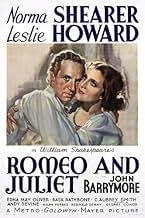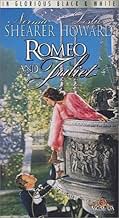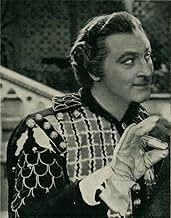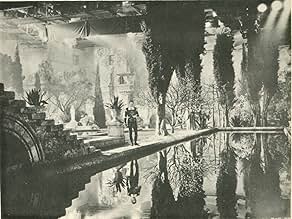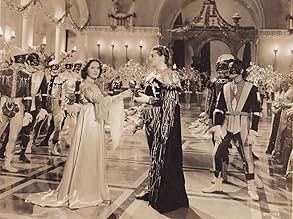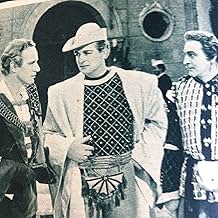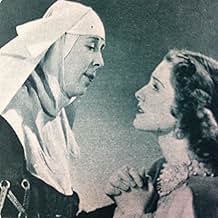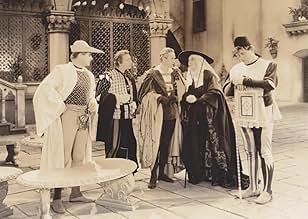IMDb रेटिंग
6.5/10
2.4 हज़ार
आपकी रेटिंग
अपनी भाषा में प्लॉट जोड़ेंYoung love is poisoned by a generations long feud between two noble families.Young love is poisoned by a generations long feud between two noble families.Young love is poisoned by a generations long feud between two noble families.
- निर्देशक
- लेखक
- स्टार
- 4 ऑस्कर के लिए नामांकित
- 4 जीत और कुल 5 नामांकन
Charles Bancroft
- Nobleman
- (बिना क्रेडिट के)
Dean Benton
- Minor Secondary Role
- (बिना क्रेडिट के)
Carlyle Blackwell Jr.
- Tybalt's Page
- (बिना क्रेडिट के)
John Bryan
- Friar John
- (बिना क्रेडिट के)
फ़ीचर्ड समीक्षाएं
The Adrian (and Messell) costumes are magnificent. The sets & cinematography are beautifully realized & director George Cukor does the best he can with what he has been given but the absurd casting of actors 20 years, or more, too old cannot be ignored. Juliet is supposed to be around 13 & Norma Shearer is in her mid 30s. Romeo is to be approximately 16. Leslie Howard is in his mid 40s. The foolish, romantic & tragic path taken by Romeo & Juliet is because of their youth. With these 2 way too old actors, it makes the characters behave as if they are developmentally challenged. It is not how adults behave. I'm am not a student of Shakespeare but I've read the play. Many necessary cuts were made to the text in order to get it to the screen or it would've ended up being over 4 hours long. I don't complain of these cuts. I don't complain of the line readings by some actors. I respect how the studio & Thalberg put the money & attention to detail into the production. Accomplished Shakespearean acting coaches were brought in to get the best performances from the actors. I believe Norma Shearer worked hard to do her best but oh my. She is not Juliet. Leslie Howard is ok but both wouldve been better cast as Lord and Lady Montague or Lord and Lady Capulet. It is a lush & lavish production. I can admire it as a beautiful elegant bauble. If I don't pay close attention to the actors, I can enjoy the spectacle but I cannot accept Shearer & Howard as the lead characters. It's a distraction I cannot pretend isn't there. That they are too old is a valid reason to critique the movie harshly.
The fine cast and production make this adaptation of "Romeo & Juliet" a satisfying one, both as a movie and as a realization of Shakespeare's play. Most of the cast is matched up very well with their characters, and the lavish settings provide a good backdrop for the drama.
Although it's soon clear that Leslie Howard and Norma Shearer are quite a bit older than the original characters were, in other respects they are well cast. Shearer's eager innocence and Howard's refinement fit together well, and although they are clearly not the teenage characters of the original, their romance is believable and convincing in itself.
The other roles include some nice casting. Reginald Denny as the loyal Benvolio, Basil Rathbone as the hard-hearted Tybalt, and Edna May Oliver as Juliet's bustling nurse are all enjoyable to watch. But the highlight of the cast is John Barrymore, who steals every scene as the fun-loving, ill-fated Mercutio, a character who is well-suited to Barrymore's strengths. It's a blessing that at least one of Barrymore's numerous Shakespearean roles was captured in a film for posterity.
The script abridges many of the scenes for cinematic purposes, and it does well in fleshing out the basic story with the duels, festivities, and other events, at times also dramatizing developments that in the original text are only mentioned by the characters. Overall, it is a well-conceived, well-executed, and enjoyable movie version of the famous story.
Although it's soon clear that Leslie Howard and Norma Shearer are quite a bit older than the original characters were, in other respects they are well cast. Shearer's eager innocence and Howard's refinement fit together well, and although they are clearly not the teenage characters of the original, their romance is believable and convincing in itself.
The other roles include some nice casting. Reginald Denny as the loyal Benvolio, Basil Rathbone as the hard-hearted Tybalt, and Edna May Oliver as Juliet's bustling nurse are all enjoyable to watch. But the highlight of the cast is John Barrymore, who steals every scene as the fun-loving, ill-fated Mercutio, a character who is well-suited to Barrymore's strengths. It's a blessing that at least one of Barrymore's numerous Shakespearean roles was captured in a film for posterity.
The script abridges many of the scenes for cinematic purposes, and it does well in fleshing out the basic story with the duels, festivities, and other events, at times also dramatizing developments that in the original text are only mentioned by the characters. Overall, it is a well-conceived, well-executed, and enjoyable movie version of the famous story.
While I was looking for new materials to help teach "Romeo and Juliet," I found the 1936 version of the play and naturally I was intrigued. I'm assuming that most people know the basic plot and have seen other versions of the film, if this is not the case you may want to stop reading and keep the surprise for viewing.
This version is faithful if not to the exact order of all the dialogue then to the acts and scenes written by Shakespeare. For those teachers that are looking for a version that explains how the letter from Friar Lawrence never reaches Romeo and the reaction of the local populace to "Plague," this is the version that does it very well. Not only do we learn why Friar John never gets to Romeo but we also get the death duel between Romeo and Paris, a scene that has been cut out of every other version I've seen. Plus we get the closing moment of peace between the families. However, the death of Lady Montague is omitted.
The movie leaves a little to be desired by modern audiences and the typical class of high school freshman many need some heavy prep work to get them ready to view "black and white" and "old" as something other than "lame." But, I think that segments of the film would be well worth showing to the class and viewed as a treat and not a torture when it's not the whole product being shoved down in one lump.
I recommend checking it out as an additional resource to add a balanced movie perspective to the characters Shakespeare created. The main problem with it is the age of the actors playing the parts of all these young people. Leslie Howard is 40 years old. Norma Shearer must be of a similar age and it shows in some of the scenes. The age of the people supposedly playing teenagers does strain credibility and at times the acting leaves a lot to be desired. They don't convincingly play "passion." You can chalk the overall feeling of muted emotion to the era because at times the emotions do come through brilliantly.
This version is faithful if not to the exact order of all the dialogue then to the acts and scenes written by Shakespeare. For those teachers that are looking for a version that explains how the letter from Friar Lawrence never reaches Romeo and the reaction of the local populace to "Plague," this is the version that does it very well. Not only do we learn why Friar John never gets to Romeo but we also get the death duel between Romeo and Paris, a scene that has been cut out of every other version I've seen. Plus we get the closing moment of peace between the families. However, the death of Lady Montague is omitted.
The movie leaves a little to be desired by modern audiences and the typical class of high school freshman many need some heavy prep work to get them ready to view "black and white" and "old" as something other than "lame." But, I think that segments of the film would be well worth showing to the class and viewed as a treat and not a torture when it's not the whole product being shoved down in one lump.
I recommend checking it out as an additional resource to add a balanced movie perspective to the characters Shakespeare created. The main problem with it is the age of the actors playing the parts of all these young people. Leslie Howard is 40 years old. Norma Shearer must be of a similar age and it shows in some of the scenes. The age of the people supposedly playing teenagers does strain credibility and at times the acting leaves a lot to be desired. They don't convincingly play "passion." You can chalk the overall feeling of muted emotion to the era because at times the emotions do come through brilliantly.
The lavish treatment given to this by MGM and Irving Thalberg (his final production showcasing his wife Norma Shearer as Juliet) does work, as do the mature lovers and their supporting cast (Leslie Howard fitting the part of Romeo perfectly, John Barrymore and Basil Rathbone out-swashing each other as Mercutio and Tybalt), Edna May Oliver as the Nurse, typically loud, and Ralph Forbes as a bizarre Paris (no, I can't see why Juliet would want to marry him either, despite her parents' wishes). The music is lovely, despite being stolen from more classical stuff, the settings are perfectly in tune, the verse is spoken with some feeling and inspiration. Why this version doesn't get seen more often I don't know (not even on video in the UK).
Despite the fact we have a 47 year old Romeo, a 36 year old Juliet, and a 54 year old Mercutio; George Cukor's production for MGM of Romeo and Juliet manages to entertain and well.
Of course these protagonists are all teenagers, but these players have all played romantic parts in an age when romance was not something to be cynical about and they do fit their roles well. No Romeo was ever more dashing than Leslie Howard or a Juliet as passionate as Norma Shearer.
John Barrymore as Mercutio is a bit of an exception. I look at him and I think of another Shakespearean character who simply doesn't want to grow up and spends his time with the young blades of his day at the tavern. That would be Falstaff in Henry IV in both parts and if you think of Barrymore's Mercutio in that way, his interpretation makes a lot of sense.
My favorite in this film has always been Tybalt and Basil Rathbone plays him with fire and passion. Rathbone got an Academy Award nomination, the first of two, for Best Supporting Actor in the first year Supporting Actor Awards were given out. He lost however to Walter Brennan in Come and Get It. He's just spoiling for a fight with some Montagues and in the end he unfortunately gets one.
Romeo and Juliet is insightful into the Italy of the times. Italy was a geographical expression not a nation. In fact it was ruled mostly by the German entity, the Holy Roman Empire. But inside the empire and out it was a succession of petty states, constantly at war with each other. Sometimes the causes of the wars were long forgotten, but the hostilities took on a life of their own.
Right down to a couple of wealthy families in the small town of Verona where the prince there has his hands full trying to keep the Montague and Capulet feud from spilling over into violence every time some of them meet in his town.
With this background a young prince of Montague just getting over another bad romance and a princess of Capulet whose father has her slated to marry another meet and fall in love. Even when they find out their respective pedigrees, it makes no difference.
In fact the idea that love can bridge all barriers is what I believe makes Romeo and Juliet as popular as it is. It's a lesson people and nations could learn.
Norma Shearer got an Oscar nomination for playing Juliet, but lost to Luise Rainer in The Great Ziegfeld as Best Actress. George Cukor and the film itself also were up, but lost for best director and best picture.
Andy Devine plays the small part of Peter, a Capulet servant and I'm sure you're wondering what Andy Devine was doing in Shakespeare. So did he when he was cast in the part. The story goes that he went to George Cukor and told him he hadn't foggiest idea what he was doing in a classic Shakespeare play, he'd never done anything like this. Cukor supposedly told him, that was to his credit and that he would be the only member of the cast who would not be telling him how to direct the film. Turned out Cukor was right, but the film got made.
And that's definitely for the better.
Of course these protagonists are all teenagers, but these players have all played romantic parts in an age when romance was not something to be cynical about and they do fit their roles well. No Romeo was ever more dashing than Leslie Howard or a Juliet as passionate as Norma Shearer.
John Barrymore as Mercutio is a bit of an exception. I look at him and I think of another Shakespearean character who simply doesn't want to grow up and spends his time with the young blades of his day at the tavern. That would be Falstaff in Henry IV in both parts and if you think of Barrymore's Mercutio in that way, his interpretation makes a lot of sense.
My favorite in this film has always been Tybalt and Basil Rathbone plays him with fire and passion. Rathbone got an Academy Award nomination, the first of two, for Best Supporting Actor in the first year Supporting Actor Awards were given out. He lost however to Walter Brennan in Come and Get It. He's just spoiling for a fight with some Montagues and in the end he unfortunately gets one.
Romeo and Juliet is insightful into the Italy of the times. Italy was a geographical expression not a nation. In fact it was ruled mostly by the German entity, the Holy Roman Empire. But inside the empire and out it was a succession of petty states, constantly at war with each other. Sometimes the causes of the wars were long forgotten, but the hostilities took on a life of their own.
Right down to a couple of wealthy families in the small town of Verona where the prince there has his hands full trying to keep the Montague and Capulet feud from spilling over into violence every time some of them meet in his town.
With this background a young prince of Montague just getting over another bad romance and a princess of Capulet whose father has her slated to marry another meet and fall in love. Even when they find out their respective pedigrees, it makes no difference.
In fact the idea that love can bridge all barriers is what I believe makes Romeo and Juliet as popular as it is. It's a lesson people and nations could learn.
Norma Shearer got an Oscar nomination for playing Juliet, but lost to Luise Rainer in The Great Ziegfeld as Best Actress. George Cukor and the film itself also were up, but lost for best director and best picture.
Andy Devine plays the small part of Peter, a Capulet servant and I'm sure you're wondering what Andy Devine was doing in Shakespeare. So did he when he was cast in the part. The story goes that he went to George Cukor and told him he hadn't foggiest idea what he was doing in a classic Shakespeare play, he'd never done anything like this. Cukor supposedly told him, that was to his credit and that he would be the only member of the cast who would not be telling him how to direct the film. Turned out Cukor was right, but the film got made.
And that's definitely for the better.
क्या आपको पता है
- ट्रिवियाThe film contains the only on-screen sword fight that expert swordsman Basil Rathbone won in his entire film career.
- भाव
Juliet - Daughter to Capulet: My bounty is as boundless as the sea, My love as deep. The more I give to thee, The more I have, for both are infinite.
- कनेक्शनFeatured in Master Will Shakespeare (1936)
टॉप पसंद
रेटिंग देने के लिए साइन-इन करें और वैयक्तिकृत सुझावों के लिए वॉचलिस्ट करें
- How long is Romeo and Juliet?Alexa द्वारा संचालित
विवरण
- रिलीज़ की तारीख़
- कंट्री ऑफ़ ओरिजिन
- आधिकारिक साइट
- भाषा
- इस रूप में भी जाना जाता है
- Romeo in Julija
- फ़िल्माने की जगहें
- उत्पादन कंपनी
- IMDbPro पर और कंपनी क्रेडिट देखें
- चलने की अवधि
- 2 घं 5 मि(125 min)
- रंग
- पक्ष अनुपात
- 1.37 : 1
इस पेज में योगदान दें
किसी बदलाव का सुझाव दें या अनुपलब्ध कॉन्टेंट जोड़ें


